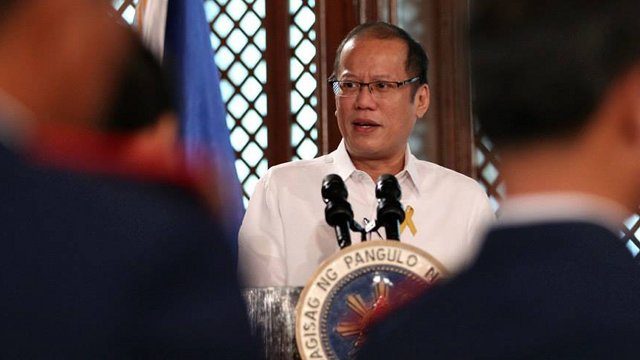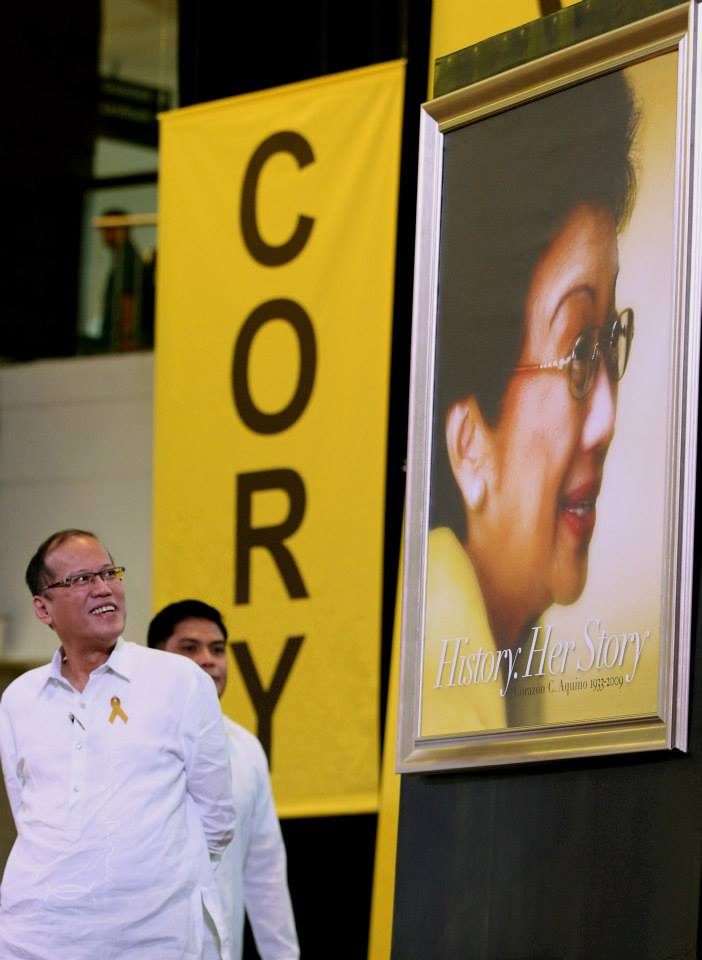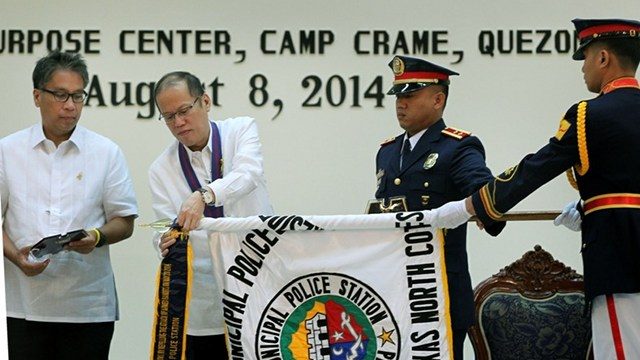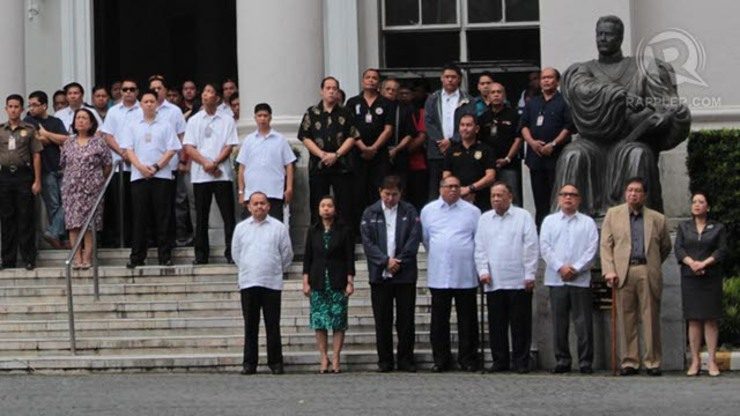SUMMARY
This is AI generated summarization, which may have errors. For context, always refer to the full article.

MANILA, Philippines – President Benigno Aquino III’s flip-flop on charter change sparked strong reactions, ranging from concern about his mother’s legacy, the balance of powers in government, and to critics, even dictatorship.
The idea that Interior Secretary Manuel “Mar” Roxas II first proposed last week which many politicians and observers shot down gained credence now that it came from the President’s mouth. While administration and opposition lawmakers are divided on Aquino’s motives, his statement opened the door for debates on changing the 1987 Constitution.
It was a statement that followed controversy about his criticism of the Supreme Court’s ruling against key acts under the administration’s special spending measure, the Disbursement Acceleration Program (DAP). It also comes after heightened talk on the 2016 presidential elections, with rivals Vice President Jejomar Binay and Roxas floating their own trial balloons and clashing on who endorses whom.
To observers, charter change is not a bad idea but the President is doing it for the wrong reasons.
“We should not be talking about terms of office but the whole system,” Ateneo School of Government Dean Antonio La Viña told Rappler. “It’s not about PNoy or Binay or Grace Poe. People react that way because it’s all about personalities.”
We start the conversation on charter change with La Viña and Earl Parreño, board member of the Institute for Political and Electoral Reform (IPER). They tell us why the debate should go beyond term limits and the Supreme Court, and the consequences of making the President’s musings a reality.
What do you make of the President’s turnaround on charter change?
La Viña: It’s a surprise given that he’s always been clear about not considering constitutional change. I was surprised. But as we also know, this is not the first time. President Gloria Macapagal-Arroyo came around to endorsing charter change and then [President Fidel] Ramos in the last part of his term endorsed constitutional change.
I am for constitutional change because I think there’s nothing wrong with it. We have a good Constitution but it prescribes too much. It was a post-dictatorship Constitution. We need to talk about what needs to be updated. It has many policy proscriptions that might be different today. So we need to have that conversation whether the same proscriptions as before continue to be valid today.
For me, it’s funny because the main reason why the President should want to change the Constitution is for the Bangsamoro law. Now that he’s changing his mind, that’s good because we have more options.
Parreño: I was also surprised. To be frank, I am also in favor of charter change. But there should be clear provisions that we will amend in the Constitution. People’s knee-jerk reaction is they are against charter change because the President might become dictatorial but we know that this Constitution was rushed. It was just made in a few months so it’s not perfect.
But of course, in amending the Constitution, the incumbent should not benefit from this. The mere increase in the salary law is not supposed to be applicable to the sitting president, what more term extension?

Where do you think the President is coming from? How come all of a sudden he is entertaining this idea?
La Viña: I think it’s a reaction to the Supreme Court ruling on DAP. He’s concerned about judicial overreach. I would be concerned because you see that every road now goes to the Supreme Court. Every case goes to the Supreme Court so that’s a genuine concern. It’s just that I think it’s the wrong solution to the concern.
I also think there is this fear of being a lame duck too early. Right now, unbelievably, two years before, we’re all already [talking] about the [2016] elections. It’s quite unbelievable. Last time, we started in October 2009, a year before the presidential elections. Now it’s a year and a half. So there’s that danger of being a lame duck.
Parreño: I don’t think the President wants to cling to power. But of course, he wants to make sure of 3 things. One, that his programs will be continued because he really believes in his programs. Two, on the personal side, he wants the person he will endorse for president to win. Three, I think he does not want what happened to past presidents who were jailed to happen to him. The DAP is his weakest point actually. He will be very vulnerable because of the Supreme Court ruling. He wants to play it safe for him and his team.
He wants to test the waters so this is what you call a trial balloon. If people will buy the idea of term extension, the harder he will push for his candidate in 2016, who will be the one to benefit from this. At the same time, all the more he will harden his position against the Supreme Court. But if people will brush it aside or the criticism against it is so strong, he will back off.
Should we be debating the idea of a second term? Malacañang says it came from “voices, people on the ground,” that there seems to be a clamor for it.
La Viña: We should not be talking about terms of office but the whole system. I want parliamentary and federal system so it’s not about individuals and personalities. People react that way because it’s all about personalities. The conversation should be: what should be best for the Philippines as a system of government?
We shouldn’t base the decision on charter change because the LP wants to stop Binay. The exact example there is FVR (Ramos). This was why people wanted FVR to run. Some people around FVR saw him as the only one who could stop Erap (former President Joseph Estrada). But the reason Cory [Aquino] and Cardinal Sin opposed it is because they didn’t want a Marcos situation all over again. The reason now has to be different.
Let’s rise above personalities. When you talk about the timeline of a Constitution, it’s 20 to 40 years. This Constitution lasted for over 20 years. Let’s look at the next 20 years. The issues we are facing now are globalization, climate change. It’s not PNoy or Binay or Grace Poe.
Parreño: Clamor? What clamor? What voices? Who are these people on the ground they are talking to? There is no clamor. People do not care about term extension now. What people are busy with is elections. I go around in the field and I do not hear talk of term extension. People are talking about the elections.
If the administration wants to institutionalize reforms, term extension is the most inappropriate way of reforming the system. If you want to reform the system, we should stabilize the system first. The fact that you’re going to extend the term of the president and favor the incumbent will always destabilize the system. It will create a bad precedent.

The President says he is concerned about “judicial reach.” Where is this headed?
La Viña: He cannot do anything with constitutional change. The power of judicial review is inherent in the judiciary. You don’t need it in the Constitution. It was only stated there because the Marcos court refused to exercise it because of fear of Marcos. But they always had it. The reason you have judicial review is you have judges to decide if a law is constitutional or not, which law applies, which law is valid or not. That’s part of what they have to do.
The way to solve the problem is to appoint judges with the concept of restraint: justices from the academe, the executive branch. Justices from Congress and regular judges tend to prescribe policy. Even now, the ones restrained are [Chief Justice Maria Lourdes] Sereno and [Justice Marvic] Leonen because they come from academe. We are taught and we teach that you should not use judicial review lightly, just in the most important cases like Martial Law because you waste power.
I love it. Let’s do cha-cha but the President might be doing it for the wrong reason, which is the Supreme Court. Because that can’t be changed by changing a definition of judicial power or judicial review. That’s inherent. That can only be changed by abolishing the judiciary, which I don’t think the president wants to do.
Parreño: I think his problem is with the Supreme Court overextending its power in what are supposed to be executive decisions or legislation. I think what must be reviewed is up to what extent the Supreme Court can rule on matters pertaining to the Constitution. For example, contracts. Could the Court issue indefinite restraining orders? Because I think that’s purely an executive function.
There are many cases during the time of GMA (Arroyo) where the Court ruled on contracts, airports, and flip-flopped on the cityhood issue. So I think we should review it but there are also gray areas like is this an executive or a legislative function or is it unconstitutional like DAP. My proposal is to create a constitutional court that will rule on questions related to the constitutionality of an issue, separate from the Supreme Court.

There is concern about the impact on checks and balances. Militant groups say the President’s idea of charter change is dictatorial.
La Viña: I’m not worried because even if he pursues his concept of charter change, he won’t succeed because judicial review is inherent in the court. It’s funny for me the militant groups are now the number one defenders of the Constitution. Because if you’re a militant group, you want to change the Constitution for the better: advocate for better farmers’ rights, labor rights, environmental rights, to make it more progressive constantly because this is a conservative Constitution. I find it funny they are now the defenders of the status quo. It’s unique.
Parreño: Checking the powers of the judiciary is not weakening the judiciary. It’s just clarifying the bounds of its powers like clarifying the bounds of the legislative powers, the executive powers. Our powers should be bounded. If it’s unbounded, it will become dictatorial. These bounds are elastic. It’s just clarifying the bounds.
If it were up to me, I would want a shift to a parliamentary system. Do away with the presidential system. That way, you improve management by merging the legislative and executive powers, so it’s easier. The glitches in the legislative mill will be reduced because it’s the government calling the shots so it could create a more efficient system. There will be more accountability. You can immediately replace the prime minister, the head of the government. So you address issues brought out by DAP if you merge executive and legislative powers.
Considering the failure of past presidents to change the Constitution and having two years left in this administration, how feasible is charter change?
La Viña: If the President is serious about this, his only chance is the next 6 months. This will have to be the priority. Set aside everything else like DAP and Bangsamoro because this is a conversation that will occupy the country totally. Everything will suffer, especially if you have Congress do this. Then again, why even pass a Bangsamoro law if you can include this in charter change?
My proposal is a constitutional convention. Start in October or November. It will take 6 months to draft a Constitution, two to 3 months in the campaign. By November 2015, have it ratified. If not, that’s already election season by December 2015. That will be chaotic. Binay et al will already be campaigning.
I assume the President is serious about it. I assume he is thinking about it. So what if Marcos wanted it? FVR also wanted it. FVR was a good president. There are so many “so whats.” So what if the reason is to stop Binay? FVR wanted to stop Erap. For all of these, the sole question is not about PNoy, Binay or LP but what’s good for the country. – Rappler.com
Add a comment
How does this make you feel?
There are no comments yet. Add your comment to start the conversation.